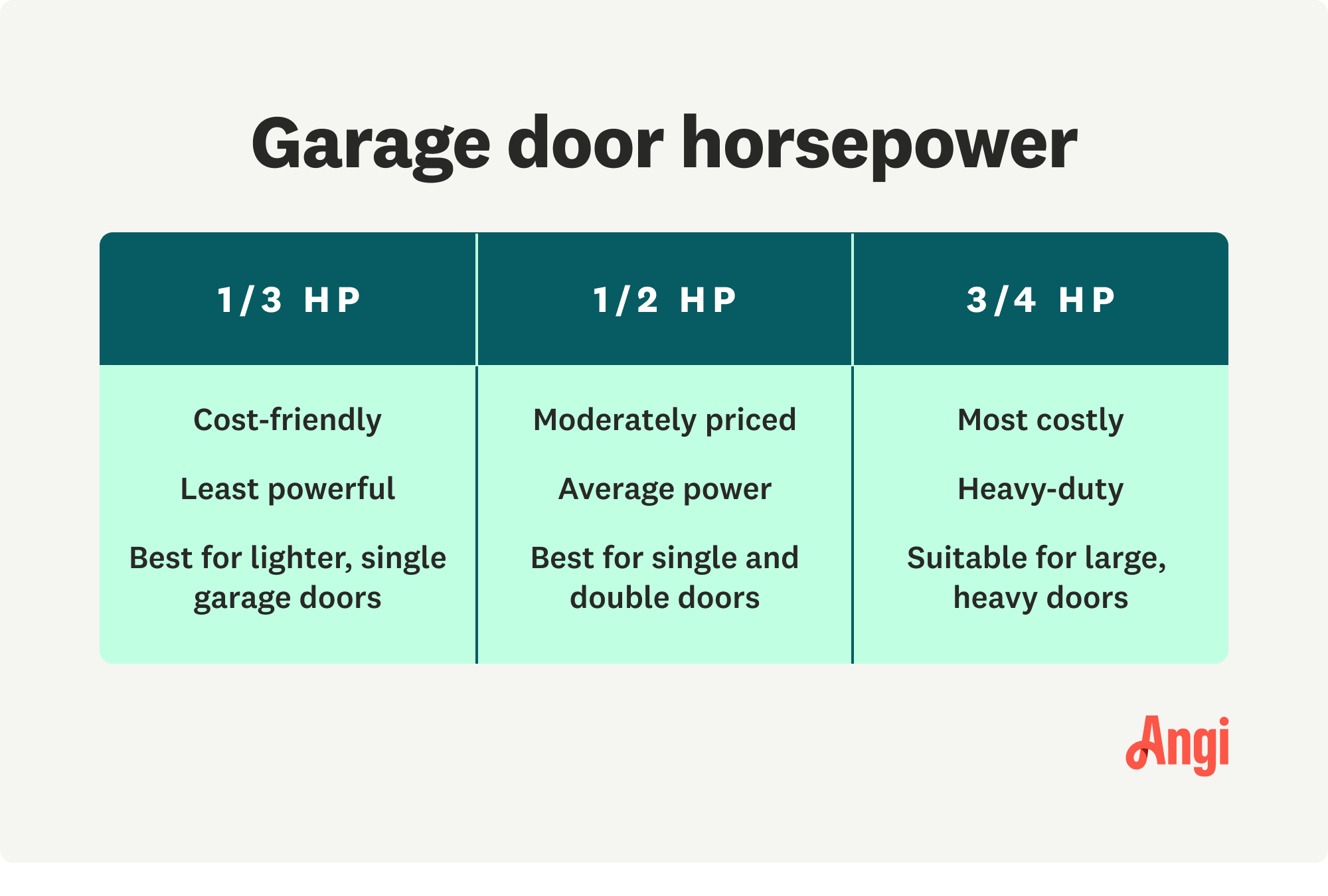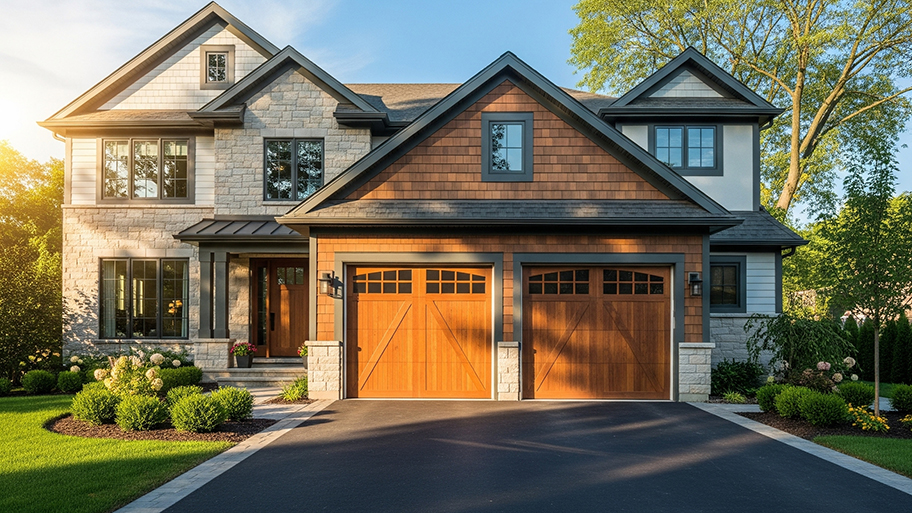
Want to ensure your home is secure for storm season? We discuss hurricane garage door costs and which factors influence the price tag.
Give your garage door opener a break with the right horsepower


Most garage door openers have a 1/2 horsepower motor.
Your garage door may be too powerful if you have a lightweight door.
Conversely, a lower horsepower for a heavy door can be too weak.
The average cost to install a garage door opener is between $225 and $550.
Your garage door opener may not be something that you think about on a daily basis—that is, until it starts to act up or needs replacing. If you're on the hunt for a new garage door opener and want to ensure that you choose the correct power, you'll need to consider the size of your garage door, the weight, the type, and how often you use your garage. This guide will help you choose the right horsepower for your garage door opener.
When dealing with heavy garage doors, it's crucial to regularly check and maintain the lifting mechanisms for safe and smooth operation.

There are six main types of garage door openers, including the following:
Chain drive garage door openers
Belt-driven garage door openers
Wall-mounted garage door openers
Screw drive garage door openers
Direct drive garage door openers
Smart garage door openers
As the most common type of garage door opener, chain drive openers use a metal chain to lift and close the garage door. Akin to a bicycle chain, these garage door openers crank a chain via a pulley system as the operating mechanism.
In a belt-driven garage door opener, you'll find a similar mechanism as the chain drive opener—only, the belt drive opener uses a rubber, polyurethane, or fiberglass belt to operate the garage door. Without the chains in your chain-drive opener, you’ll find this mechanism is quieter.
A garage that doesn't have enough space on the ceiling to lift and shut the garage door might need a wall-mounted, or jackshift garage door opener. These garage door openers operate from the wall to increase overhead space for vehicles in your garage. As with the chain drive and belt-driven garage door openers, wall-mounted openers use a pulley system.
Unlike the other garage door openers so far on this list, a screw drive garage door opener operates using a screw-like rotation rather than a pulley system. Since the door opener operates through a rotation system, this type of garage door opener tends to be more powerful yet compact.
Direct drive garage door openers are one of the quietest types of garage door openers available. Like a chain drive or belt-driven opener, direct drive openers have a chain or belt system. However, this chain or belt does not move with a direct drive garage door opener. Instead, the motor directly moves across the chain or belt to open the door.
Some homeowners want all of the specs that come with a garage door opener. In this case, a smart garage door opener may be the best option. These garage door openers can come in any of the aforementioned types. But you’ll find your smart garage door opener has extra tech to help you monitor your garage door, open and close it with the touch of your smartphone, and other bells and whistles.

Choosing the right horsepower for your garage door opener is one of those decisions that could make—or break—your garage door and how well it works. Horsepower is a unit that measures the power an engine produces. For garage door openers, it reflects how much weight the motor can lift. The higher the horsepower, the more powerful the opener, and the heavier the door it can handle. Since most residential garage doors weigh between 100 and 300 pounds, you typically won’t see a full 1 HP garage door opener. Instead, you’ll see three main horsepower options: 1/3 HP, 1/2 HP, and 3/4 HP. Here’s a breakdown of each motor’s horsepower:
If you’re looking to keep costs down, and you have a lighter, single-car garage door—think aluminum or fiberglass—a 1/3 horsepower may work best for your home. This option is the most affordable but also the least powerful, making it ideal for doors that don’t require much muscle to move. It can handle doors up to eight feet wide but won’t last as long as more powerful options under heavy use. 1/3 HP is an ideal choice for homeowners with smaller garages or a budget to consider, but don’t expect it to be as durable or powerful as the higher horsepower models.
For the majority of two-car garages, a 1/2 horsepower garage door opener is the perfect balance of power and price. It’s strong enough to handle standard garage doors (up to 12 feet wide) without any strain. This horsepower option is the most popular choice for homeowners because it offers enough oomph for average-sized doors while being reasonably priced. If you have a typical residential garage with a standard-weight door, the 1/2 HP opener will provide reliable, long-lasting performance and can stand up to the demands of using it every day.
A 3/4 HP opener is better suited for homeowners with larger or heavier garage doors. This option delivers the most power and can handle the strain of bigger, bulkier doors—three-car garages or doors made from heavy materials—without issue. It’s especially beneficial if you’re looking for longevity, as these openers are made to last. While 3/4 HP comes with a higher price point, the durability and ability to handle tougher jobs make it a smart investment for homeowners with larger or more challenging doors.
While you can look at the horsepower alone to help you get an estimate for how powerful your garage door opener should be, you'll also want to factor in several other elements to make sure that you choose the right garage door opener strength.
A small, one-car garage will likely only need a 1/3 HP motor, while a standard, two-car garage door will need a 1/2 HP motor. Larger doors, like ones for a three-car garage, a workshop, or larger will need a 3/4 HP motor.
The size of your garage door isn't the only factor in determining how strong your garage door opener needs to be. You also need to consider the material of your garage door, as different materials have different weights.
An aluminum garage door is one of the most lightweight materials that you can choose for a garage door. Steel garage doors are also lightweight and therefore require less horsepower.
Meanwhile, as stunning as wood garage doors are for adding that extra bit of curb appeal to your home, these garage doors weigh the most and may require a stronger motor—even if you have a one-car garage.
Additionally, if you’ve insulated your garage door, this can increase the weight and bulkiness of the door and require you to upgrade the strength of your garage door opener.
Buying a garage door opener that's more affordable and has a weaker motor could save you money upfront, but you'll also want to consider the lifespan of your garage door opener when factoring in overall costs.
A more powerful motor can last longer for heavier doors. At the same time, a motor that is too powerful for a weaker material like aluminum can actually shorten the lifespan of your garage door, even if the motor lasts longer. This is because a garage door opener with too much power can accidentally lift your lightweight garage door too high, causing it to break.
If your garage door is too heavy for the garage opener, several things can happen, such as the following:
Overloaded springs lead to a jam
Springs become damaged
The tracks break or bend
Hardware loosens
An imbalanced garage door can make it appear to not have enough power and eventually lead to a jammed door that won’t budge. Always inspect the parts of your garage door before upgrading your garage door opener to rule out any issues with the spring, tracks, or cables. Sometimes, replacing the garage door spring can solve a garage door that’s on the fritz. If your garage door is out of alignment, no new and improved garage door opener will fix the problem.

Choosing the right garage door opener for your home boils down to knowing what to look for as you shop around. Here are several considerations to have on hand as you make your decision:
While a 1/2 HP garage door opener may be the ideal strength for your particular garage door, budgetary restrictions can impact your options. On top of the garage door opener itself, the average cost to install a garage door opener is between $225 and $550. But you don't always have to choose the strongest garage door opener to do the job.
If you decide to go for a 1/3 HP motor and have a two-car garage, you should still be able to use this motor—it just might have a much shorter lifespan and need replacing sooner than a 1/2 HP motor.
Depending on your garage’s location, you may wish to choose a quiet garage door opener so that it doesn’t disturb you or your family members while they're sleeping after a late-night run to the store or an early morning out to the office.
Your garage door opener’s lifespan can change based on how frequently you use your garage door. For example, if your neighbor has the exact same garage door, size, and door opener as you but often leaves the house, while you work from home, then you could get away with a garage door opener with a lower horsepower without needing to replace it as quickly.
Knowing when to replace your garage door opener is key to making the most out of your current garage opener all while staying up to date on your garage door maintenance. Here are several signs that it's time to hire a garage door opener pro to replace your opener:
The door moves slowly up and down.
You hear your garage door opener making new and unusual sounds.
Instead of smoothly opening and closing, your garage door randomly stops and reverses.
You can't get the garage door to operate.
The garage door opener visibly vibrates.
Your garage door opener is approaching the 10-year mark. Garage door openers last for 10 to 15 years on average.
Garage doors are heavy, and the spring on your door can cause serious or even fatal injuries. If your old garage door opener needs replacing, you’ll want to work with a local garage door opener repair specialist to safely realign the garage door or opener.
From average costs to expert advice, get all the answers you need to get your job done.

Want to ensure your home is secure for storm season? We discuss hurricane garage door costs and which factors influence the price tag.

A garage door repair costs less than you might think, considering you can sometimes repair individual panels. However you can’t do many fixes yourself—learn why you need a pro.
.jpg?impolicy=leadImage)
This guide shows you what you can expect for garage door roller replacement cost if your rollers are sticking or screeching.

Is your garage door frozen shut and preventing access? Use this simple how-to guide to fix the problem and take back your covered parking space.

Explore the different types of garage doors for your home, including their durability, cost, and the pros and cons of each option.

Use this guide to standard garage door sizes to pick out the right door for your new construction or garage renovation.